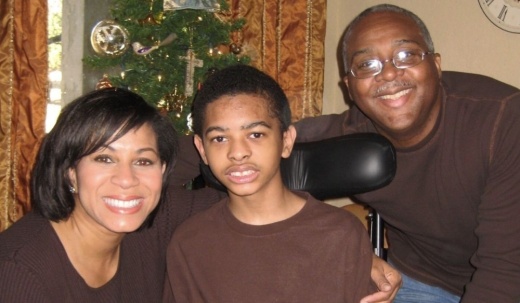Stone Oak resident Juli Henderson and her family provided much support to her youngest of five children, Robert, who spent his 18 years of life fighting a rare mitochondrial disease.
Six years after Robert’s death, Henderson is using a blog to not only share her and her family’s story, but to lend support to fellow parents who care for loved ones with special medical needs.
“It’s all to help those struggling in our community,” Henderson said.
According to Henderson, Robert was about 2 years old when he showed initial signs of delayed development compared with his twin sister Victoria. Robert then had a grand mal seizure at age 2, suffering a loss of consciousness and violent muscle contractions.
Robert would have dozens or hundreds of seizures every day for the rest of his life. At one point, he was diagnosed with a mitochondrial disorder that affected different body systems, Henderson said.
The ailment caused different types of seizures, poor stamina, muscle weakness, lack of muscle tone, heat intolerance, excessive sweating, among other symptoms that only worsened as Robert aged. He spent many days at a time in the hospital.
Later in life, genetic testing revealed Robert also had a gene alteration that predisposed him to seizures and developmental disorders. He was eventually diagnosed with cerebral palsy, autism and intellectual disability.
He underwent brain surgery and numerous other treatments, but to no avail, Henderson said.
“We did everything we could for him,” she said.
The seizures had become so frequent and severe that Robert’s parents pulled him out of Bush Middle School. He became homebound, wheelchair-bound and received nursing care for most of each day, Henderson said. He died from complications from his disease in February 2015.
Henderson said having worked as a music teacher, she sought to make sure Robert had plenty of music in his life.
“He was generally a happy young man because he was catered to,” she said. “He’s a joy to talk about, a joy in our family.”
Henderson also said her family and friends learned much about kindness while helping to care for him.
“Robert taught all of us that—compassion and care,” she added.
Henderson said she wanted to use at least an online resource to share Robert’s story to help inspire parents raising children with disabilities, but it didn’t happen immediately.
“I didn’t want to still be healing while writing. I wanted to engage other parents,” she said.
In February—six years after Robert’s death—Henderson launched the blog In Our Arms to talk about her family and to encourage parents like her to share their struggles and hopes, and to receive help and encouragement.
In addition to being on a Facebook page, In Our Arms is viewable as a separate website, complete with resources for parents with disabled children.
“I felt it should be a forum for parents to talk. They could ask questions like, ‘What equipment did you use? What services did you get?’” Henderson said.
Henderson also does public speaking and volunteers with boards of local nonprofits, such as Morgan’s Wonderland, that help to support disabled children and their families. But she said the response to the blog has been “amazing.”
In Our Arms partnered with School Scents to produce “Breathe” candles, a special custom candle that anyone may buy for themselves and their loved ones.
October is Child Loss Awareness Month, and In Our Arms has ramped up efforts to further positively help the community by donating “Breathe” candles for the local nonprofit Any Baby Can.
Here, people are encouraged to buy a candle and have it donated to a local parent caring for a disabled child. The parent will also receive a note of encouragement.
The idea, according to the blog, is that the candle helps a parent “needing a moment to breathe.”
“I just want moms to have something special,” Henderson said.
For more information, visit www.inourarms.blog or www.facebook.com/inourarmsblog.





